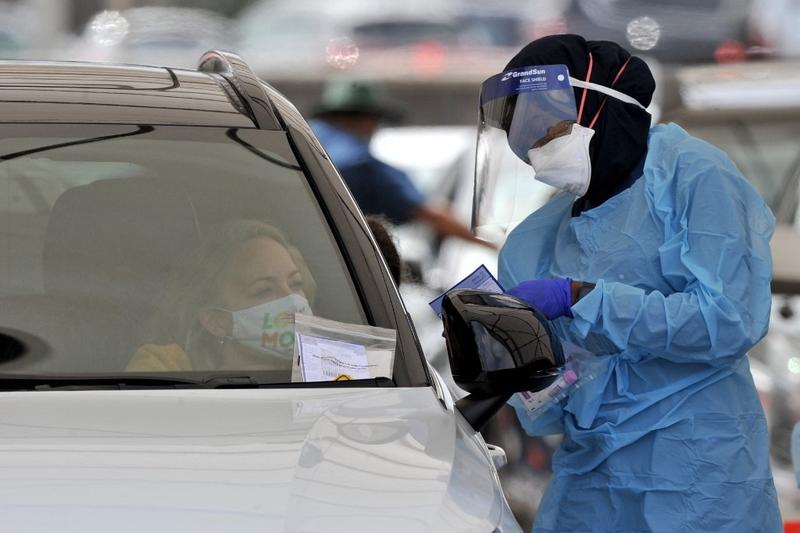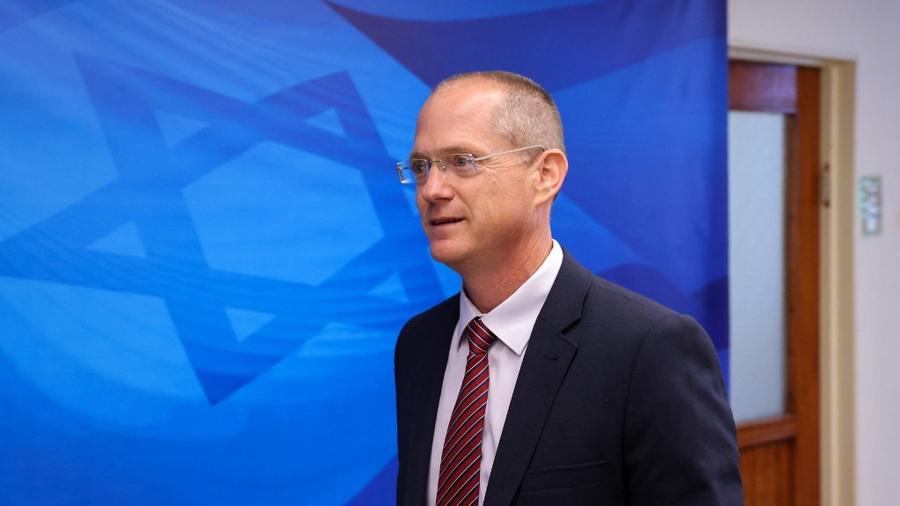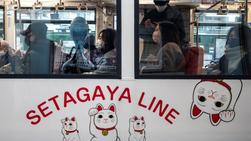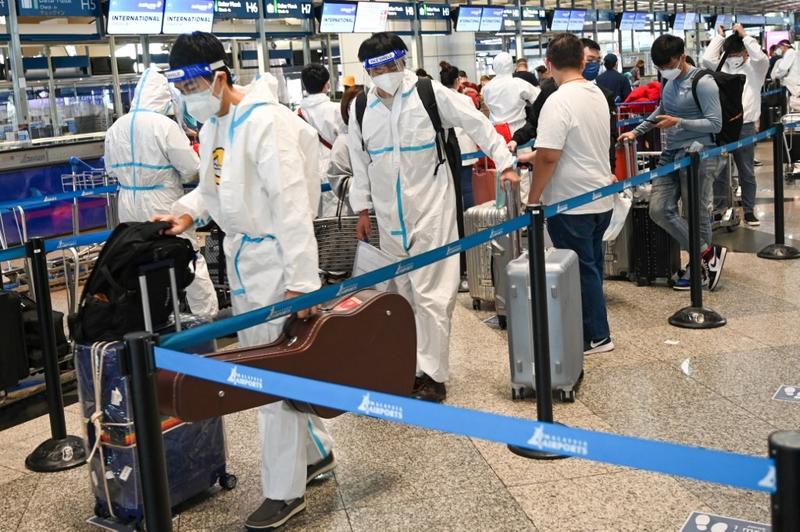 In this file photo taken on Dec 22, 2021, a health worker conducts a PCR test at the St Vincent's Bondi Beach COVID-19 drive through testing clinic in Sydney.
(MUHAMMAD FAROOQ / AFP)
In this file photo taken on Dec 22, 2021, a health worker conducts a PCR test at the St Vincent's Bondi Beach COVID-19 drive through testing clinic in Sydney.
(MUHAMMAD FAROOQ / AFP)
JERUSALEM / KUALA LUMPUR / TOKYO / SEOUL / NEW DELHI / MELBOURNE - Australia will welcome international tourists on Monday after nearly two years of sealing its borders, relying on high COVID-19 vaccination rates to live with the pandemic as infections decline.
"The wait is over," Prime Minister Scott Morrison told a Sunday briefing at the Melbourne International Airport.
Most of the country's 2.7 million coronavirus infections have occurred since the Omicron variant emerged in late November
Australia's opening to tourists is the clearest example yet of the government's shift from a strict zero-COVID-19 approach to living with the virus and vaccinating the public to minimize deaths and severe illness.
Most of the country's 2.7 million coronavirus infections have occurred since the Omicron variant emerged in late November. But with one of the world's highest vaccination rates - more than 94 percent of people aged 16 and over are double-dosed - there have been just under 5,000 deaths, a fraction of the rates seen in many other developed countries.
On Sunday, the country recorded more than 16,600 coronavirus cases, before all areas had reported, and at least 33 deaths, mainly in the three most populous states of New South Wales, Victoria and Queensland.
Whether travelers will flock back to the island continent, dubbed "fortress Australia" for its strict border controls, remains to be seen. The government hopes to boost a pre-pandemic growth sector - real tourism gross domestic product expanded 3.4 percent in 2018-2019, compared with overall GDP growth of 1.9 percent.
ALSO READ: Aussie eases COVID restrictions as hospitalizations decline
Australia has been gradually reopening since November, first allowing Australians to travel in and out, then admitting international students and some workers. From Monday, leisure travelers and more business travelers may enter.
"The reopening reinforces Australia's credentials as an open economy and will allow companies with international interests to more easily conduct business," said Steve Hughes, head of HSBC's commercial banking in Australia.
"We expect that mid-sized firms which have reached the limits of their domestic growth will have renewed confidence to consider offshore expansion."
Fully vaccinated tourists will not need to quarantine, but those not double-dosed will require a travel exemption to enter the country and will be subject to state and territory quarantine requirements.
India
India's COVID-19 tally rose to 42,822,473 on Sunday, as 19,968 new cases were registered during the past 24 hours across the country, data released by the health ministry showed.
Besides, 673 deaths were recorded since Saturday morning, taking the death toll to 511,903.
Currently there are 224,187 active cases in the country, with a decrease of 29,552 during the period.
A total of 42,086,383 people have recovered and been discharged from hospitals so far, with 48,847 new recoveries.
 In this file photo taken on June 20, 2021, Israeli Minister of Agriculture Oded Forer arrives to attend the first weekly cabinet meeting of the new government in Jerusalem. (EMMANUEL DUNAND / POOL / AFP)
In this file photo taken on June 20, 2021, Israeli Minister of Agriculture Oded Forer arrives to attend the first weekly cabinet meeting of the new government in Jerusalem. (EMMANUEL DUNAND / POOL / AFP)
Israel
Israel's Minister of Agriculture and Rural Development Oded Forer had to cancel his planned trip to the United Arab Emirates , after he was tested positive for COVID-19, the official announced in a tweet.
The minister was to sign a wide range of agreements at the UAE, alongside holding meetings with other agriculture ministers, according to the Israeli conference's website
He was scheduled to attend events held during the food, agriculture and livelihoods Week, which was launched Friday at the Dubai Expo 2020 and featured a three-day Israeli conference starting Sunday.
The minister was to sign a wide range of agreements at the UAE, alongside holding meetings with other agriculture ministers, according to the Israeli conference's website.
In his tweet, Oded Forer said the event would be held without him, and he would be on quarantine. The ministry's Director General Naama Kaufman Fass will take his place at the events.
The conference, which will be participated by scientists, industry representatives and policy makers from Israel and around the world, includes meetings and discussions on new technologies, innovation and knowledge, according to its website.
On Saturday, Israel's Ministry of Health reported 12,568 new COVID-19 cases, the lowest daily figure since Jan 3, bringing the country's caseload to 3,535,062.
The number of death cases from the virus in Israel rose to 9,842, with eight new fatalities, while the number of patients in serious condition decreased from 832 to 822.
The number of active cases declined to 142,486, the lowest number since Jan 8.
 People wearing face masks due to COVID-19 travel on a Setagaya Line tram decorated with "maneki-neko" or beckoning cat statue images in Tokyo on Jan 30, 2022. (PHILIP FONG / AFP)
People wearing face masks due to COVID-19 travel on a Setagaya Line tram decorated with "maneki-neko" or beckoning cat statue images in Tokyo on Jan 30, 2022. (PHILIP FONG / AFP)
Japan
Tokyo recorded 13,516 new COVID-19 cases on Saturday, up 1,751 from a week earlier, national broadcaster NHK reported.
It is the first daily rise from week-earlier levels since Feb. 8, NHK said, adding that the Japanese capital recorded 27 deaths, the highest this year.
A Japanese health panel on Friday approved a plan for more targeted COVID-19 curbs across much of the nation.
 In this file photo taken on Nov 29, 2021, passengers wearing personal protective equipment queue to check-in for their flight at the Kuala Lumpur International Airport in Sepang. (MOHD RASFAN / AFP)
In this file photo taken on Nov 29, 2021, passengers wearing personal protective equipment queue to check-in for their flight at the Kuala Lumpur International Airport in Sepang. (MOHD RASFAN / AFP)
Malaysia
Malaysia reported 28,825 new COVID-19 infections in the highest daily spike since the outbreak, as of midnight Saturday, bringing the national total to 3,194,848, according to the health ministry.
Malaysia reported 28,825 new COVID-19 infections in the highest daily spike since the outbreak, as of midnight Saturday, bringing the national total to 3,194,848, according to the health ministry
Among the new cases, 91 are imported and 28,734 are local transmissions, data released on the ministry's website showed.
A further 34 deaths have been reported, bringing the death toll to 32,310.
The ministry reported 18,514 new recoveries, bringing the total number of cured and discharged to 2,919,196.
There are 243,342 active cases, 238 are being held in intensive care units and 130 of those are in need of assisted breathing.
The country administered a total of 151,156 doses of the COVID-19 vaccines on Saturday, and 81.3 percent of the population have received at least one dose, 78.8 percent have been fully vaccinated and 42.6 percent have received boosters.
South Korea
South Korea reported 104,829 more COVID-19 cases as of midnight Saturday compared to 24 hours ago, the health authorities said Sunday.
The daily caseload was up from 102,211 in the previous day, hovering above 100,000 for the third consecutive day, according to the Korea Disease Control and Prevention Agency (KDCA).
The recent resurgence was driven by infections in the Seoul metropolitan area amid the rapid spread of the Omicron variant, which became a dominant strain here.
Of the new cases, 22,100 were Seoul residents. The number of newly infected people living in Gyeonggi province and the western port city of Incheon was 31,326 and 9,188 respectively.
The virus spread also raged in the non-metropolitan region. The number of new infections in the non-capital areas was 42,118, or 40.2 percent of the total local transmission.


